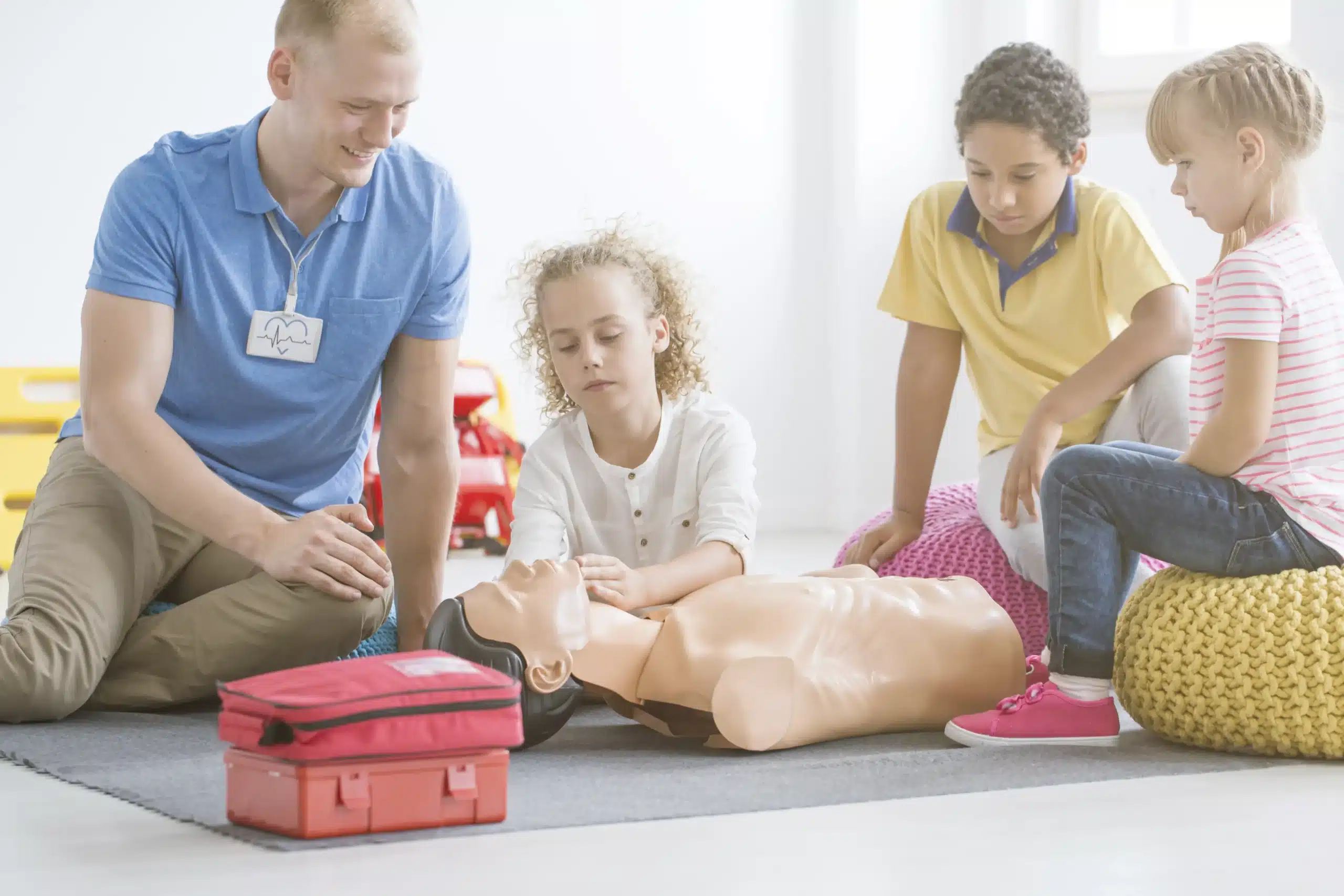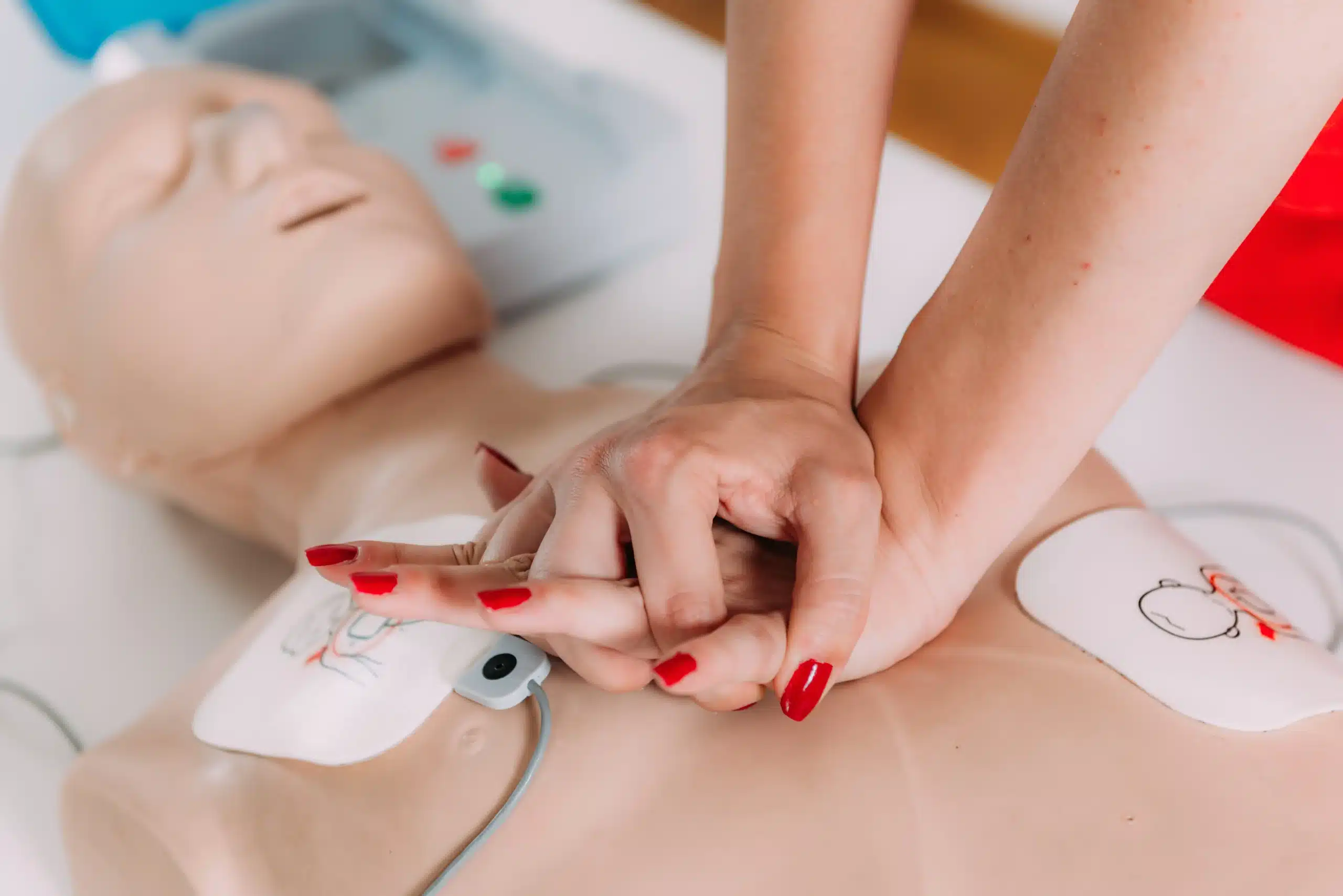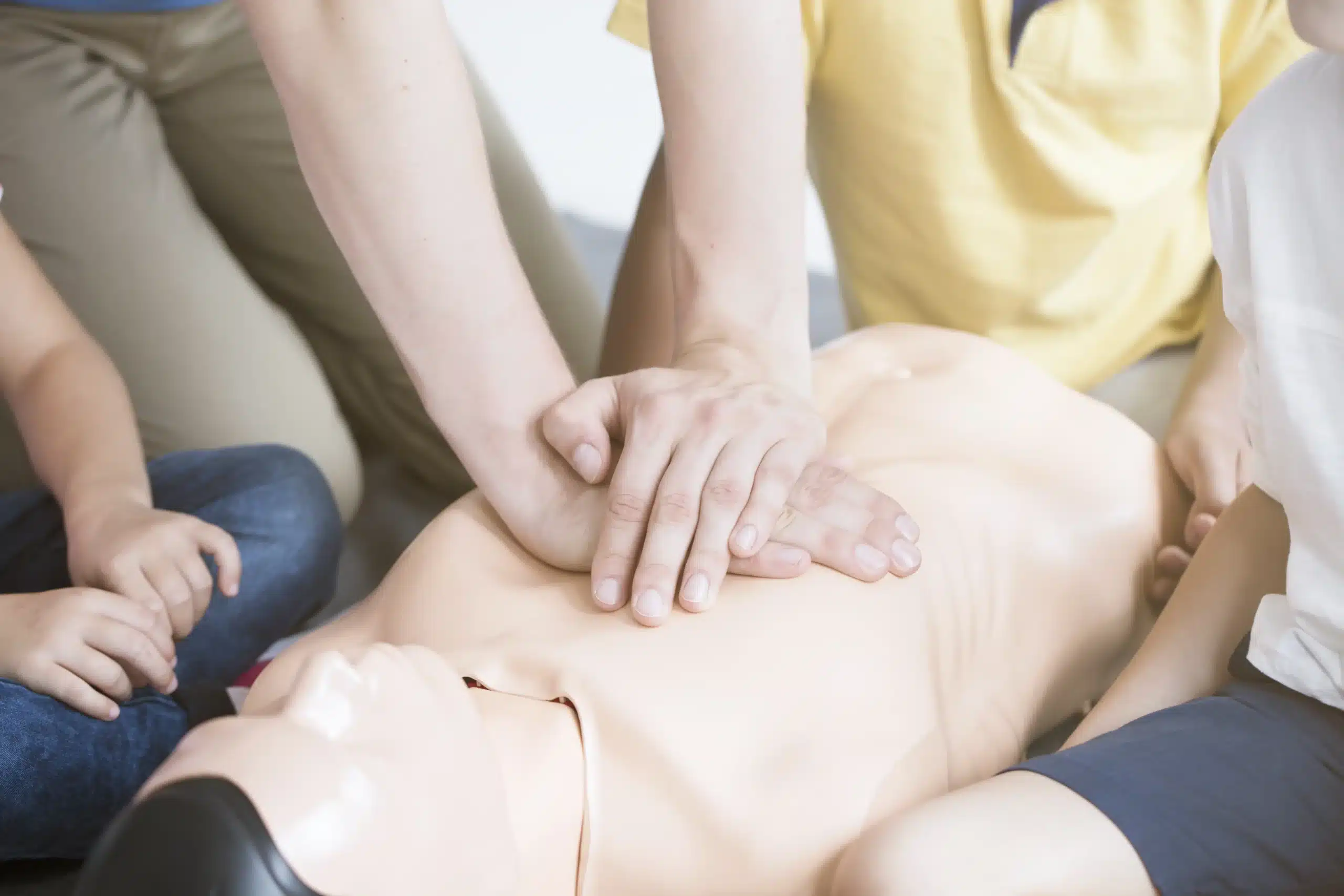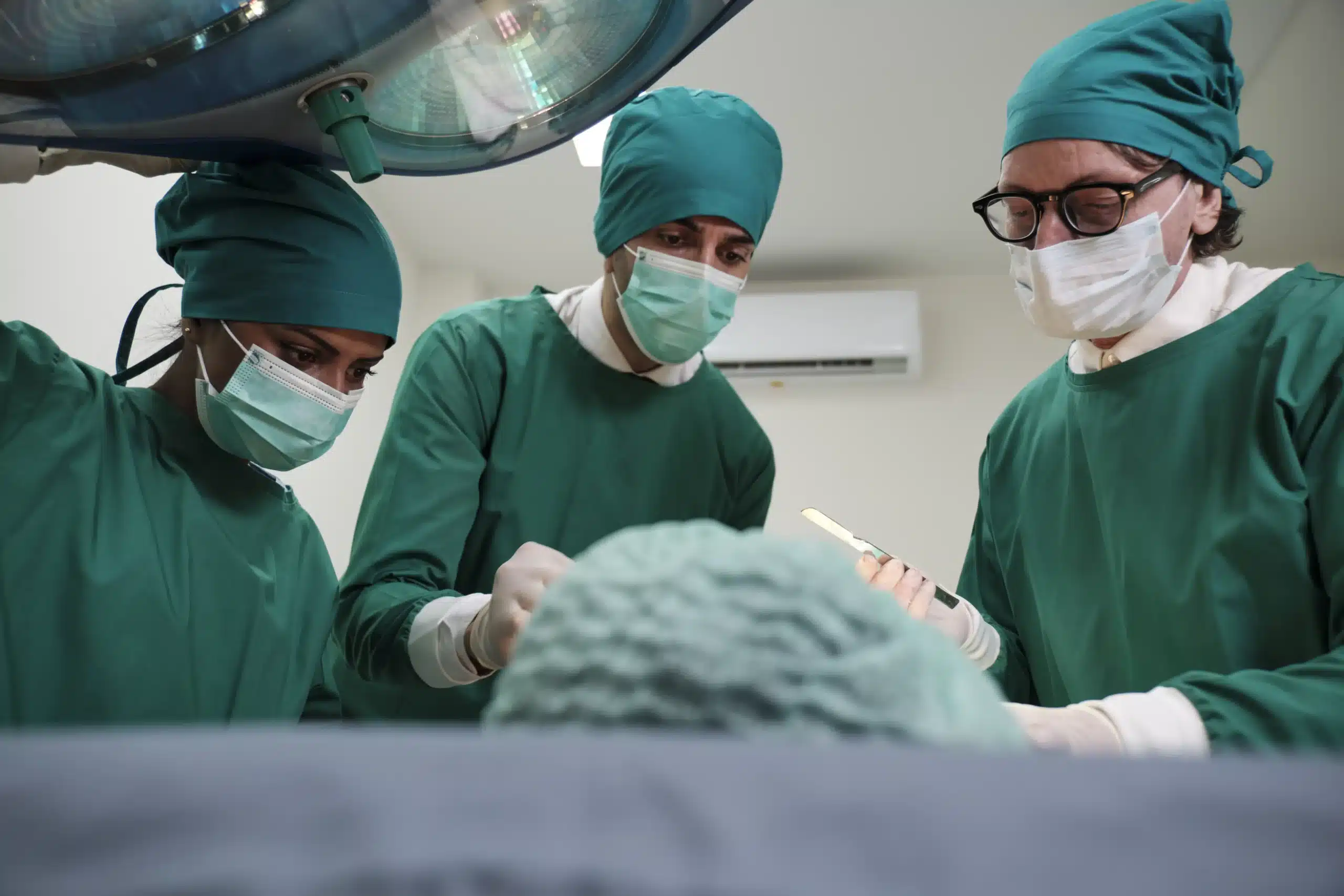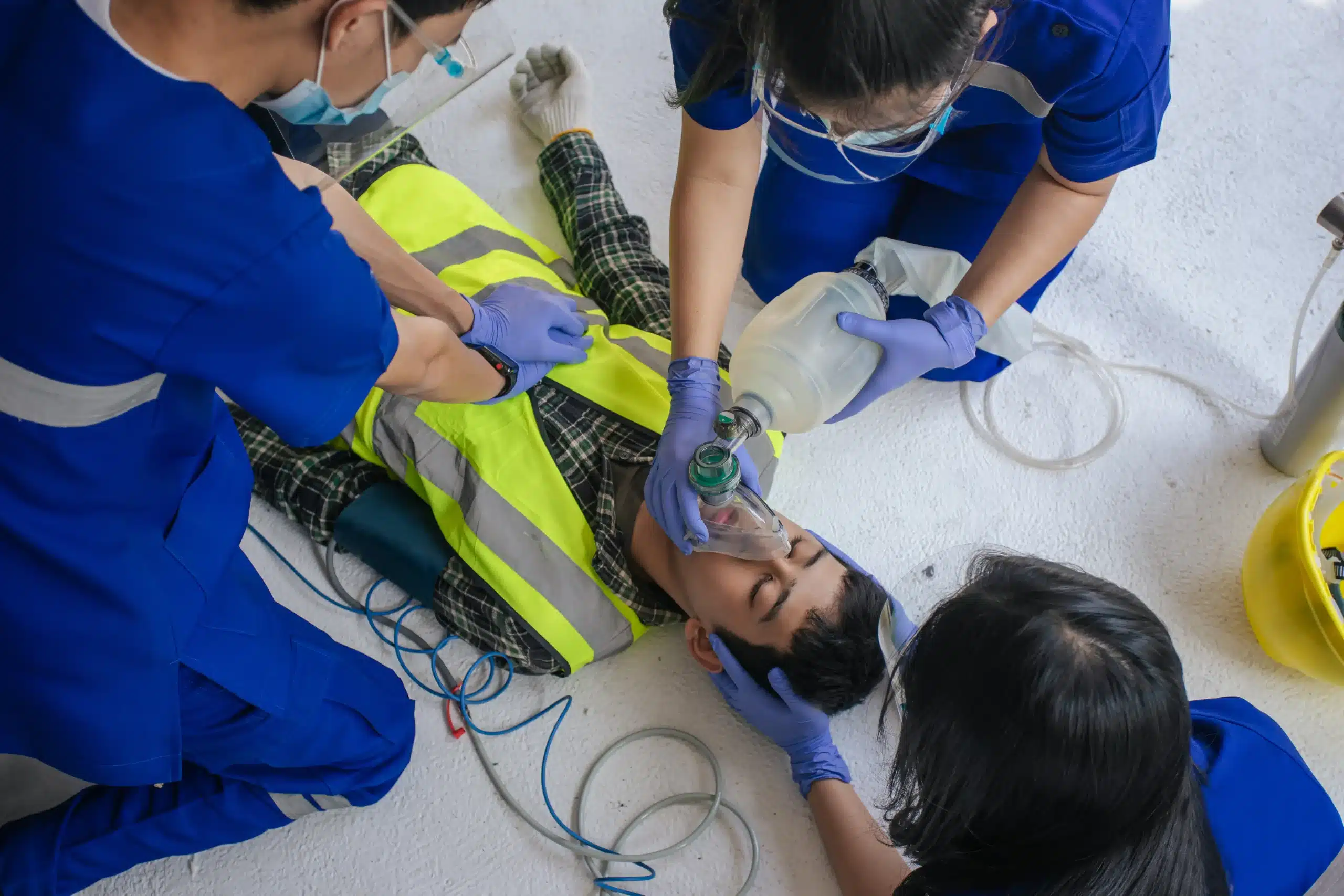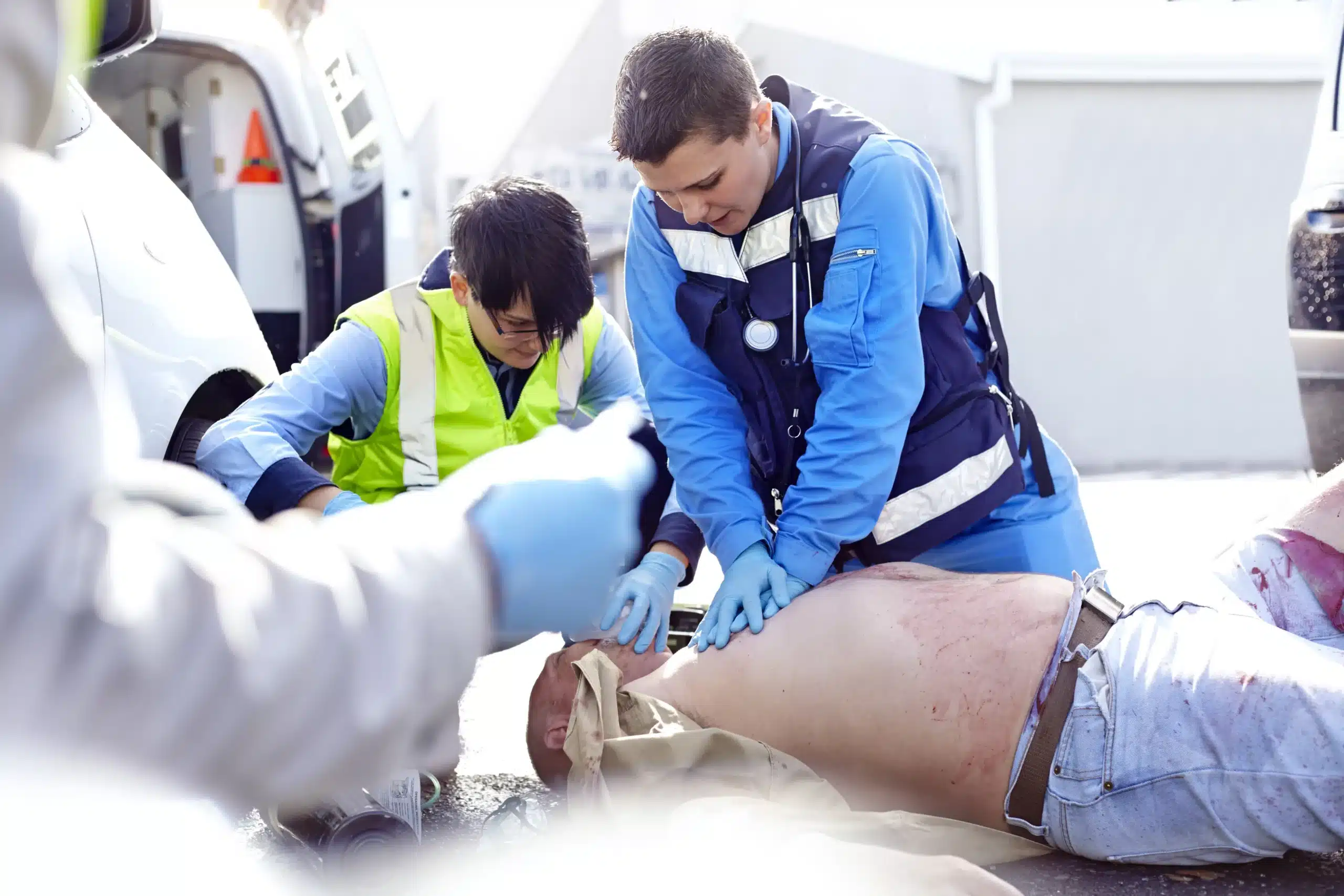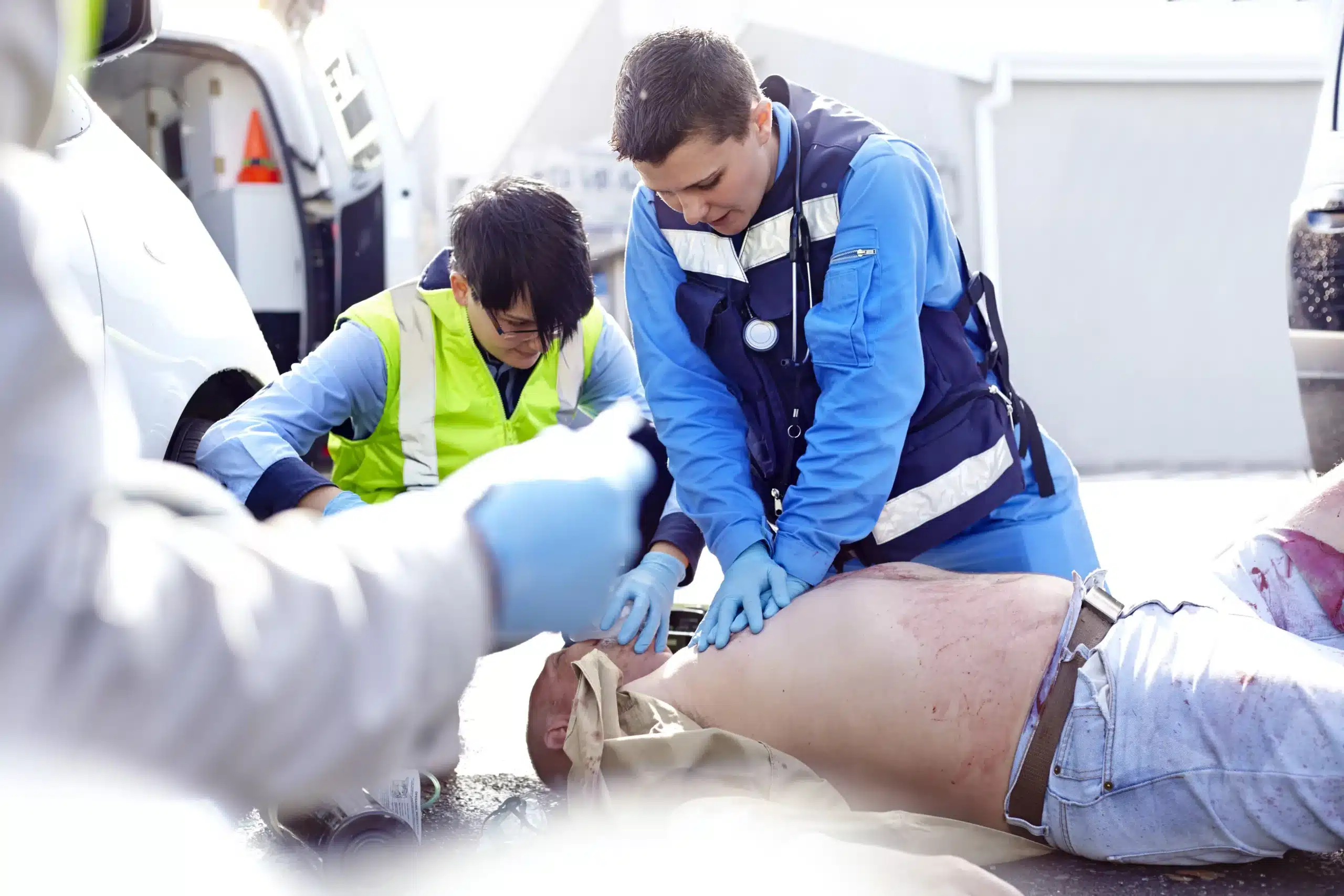In the face of a medical emergency, seconds can matter. Knowing CPR can empower you to act quickly and confidently, potentially saving a life. This guide is your go-to resource for CPR training in Hayward. Whether you’re a healthcare professional, a childcare provider, or simply someone who wants to be prepared for anything, we’ll help you find the right CPR training program in Hayward. We’ll explore the various types of CPR courses available, discuss the benefits of certification, and provide a list of reputable training providers in the Hayward area. We’ll also delve into the importance of staying up-to-date with your CPR certification and debunk common misconceptions about this life-saving technique.
Key Takeaways
- CPR training empowers you to save lives: Whether you’re a healthcare professional, childcare provider, or community member, learning CPR equips you to respond effectively in medical emergencies.
- Find the right CPR class for your needs: Consider factors like the certifying organization, course content (basic, advanced, pediatric), and schedule flexibility when selecting a program. Hands-on practice is essential.
- Stay current with your CPR certification: Renew your certification regularly and stay informed about the latest guidelines and best practices to maintain your skills and provide effective care.
What is CPR Training?
CPR (Cardiopulmonary Resuscitation) training teaches you how to perform this life-saving technique, giving you the skills to respond effectively during emergencies, especially cardiac arrest. This training is crucial because it empowers you to provide immediate care while waiting for paramedics or EMTs. You can find CPR training accessible to the public, making it possible for anyone to learn. Current American Heart Association (AHA) guidelines emphasize compression-only CPR as the preferred method, with rescue breaths needed only in specific situations. Hayward offers various AHA-certified CPR classes, ensuring participants receive high-quality instruction and the most up-to-date information.
CPR Course Types
Choosing the right CPR course depends on your specific needs and goals. Here’s a breakdown of common CPR course types offered in Hayward:
Basic CPR Training
Basic CPR training provides the foundational skills needed to respond to cardiac arrest and choking emergencies in adults, children, and infants. You’ll learn how to recognize the signs of a cardiac arrest, perform chest compressions and rescue breaths, and use an automated external defibrillator (AED). This course is ideal for anyone who wants to learn life-saving skills, including community members, teachers, coaches, and workplace responders. Often, CPR and first-aid training are combined into one course, giving you a broader skillset to handle various emergencies. CPR Education offers more information on combined CPR and first aid training.
Advanced Life Support (BLS) Courses
Basic Life Support (BLS) certification goes beyond basic CPR to equip healthcare providers—such as doctors, nurses, paramedics, and other professionals—with the skills to manage cardiopulmonary arrest and other respiratory emergencies. BLS courses cover advanced airway management, team dynamics, and the use of specialized equipment. Hayward CPR Classes offers American Heart Association certified BLS training along with other advanced courses like ACLS and PALS.
First Aid/CPR Combo Classes
Combining first aid and CPR training provides a comprehensive approach to emergency preparedness. These courses teach you how to respond to a wide range of situations, from treating minor injuries like cuts and burns to managing life-threatening conditions like heart attacks and strokes. You can find combined CPR and first aid classes at CPR Education.
Pediatric CPR
Pediatric CPR courses focus on the specific techniques required to respond to emergencies involving infants and children. These courses cover CPR for newborns, toddlers, and older children, addressing differences in anatomy and physiology. Learning pediatric CPR is especially important for parents, grandparents, childcare providers, and anyone who regularly interacts with young children. For those interested in pediatric-focused CPR training, you can explore options like In-Home CPR.
Top Hayward CPR Training Providers
Finding the right CPR training can feel overwhelming, but several excellent providers serve the Hayward area. Here’s a quick rundown to help you find the perfect fit:
Hayward CPR Classes
Hayward CPR Classes offers American Heart Association (AHA) certification courses, including BLS, ACLS, PALS, and CPR/First Aid. They focus on providing convenient, daily classes in over 60 cities and boast the lowest prices in Alameda County. As a woman-owned business, they also offer discounts for group classes, making them a great option for workplaces or community organizations. Hayward CPR Classes serves Hayward, Union City, and San Leandro. Learn more about their BLS certification or ACLS training. For larger groups, explore their group discount options.
Safety Training Seminars
Safety Training Seminars also provides AHA-certified BLS, ACLS, PALS, and CPR/First Aid training in Hayward. They offer daily classes and can even conduct training at your location for groups, making it a flexible option for busy schedules. Learn more about their programs and request information on group discounts and scheduling.
CPR Education
CPR Education focuses on providing high-quality CPR and first-aid training to residents of Hayward and surrounding areas. They are certified through the American Heart Association and aim to equip individuals with the skills and knowledge needed to save lives. Visit their website for details on courses and schedules.
American Red Cross
The American Red Cross offers a range of certifications, including CPR (adult, child, and infant), First Aid, BLS, and ACLS. Their flexible scheduling allows classes to be held at your home or business in Hayward seven days a week, including evenings. This convenient approach eliminates travel time and makes fitting training into your schedule easier. Explore their in-home training options.
What Happens in a CPR Class?
Curious about what to expect in a CPR class? Here’s a preview of what you’ll learn and experience:
Course Length and Format
CPR classes in Hayward are designed to fit your schedule. Daily classes are available, and if you have a group, we can even come to you! Group discounts make training your team or organization convenient and affordable.
Hands-on Practice
CPR training is all about learning by doing. Our classes emphasize hands-on learning, providing ample opportunities to practice your skills on mannequins and AEDs. This practical experience builds confidence and prepares you to respond effectively in a real emergency.
Certification
You’ll receive your certification card the same day you complete the skills test. This certification validates your training and qualifies you to provide CPR assistance.
Physical Requirements & Accommodations
While CPR training is hands-on, we understand that some participants may have physical limitations. The physical demands of CPR can be strenuous, so consider your abilities before enrolling. If you have any concerns, please contact us to discuss accommodations or the possibility of rescheduling. We want to ensure a comfortable and safe experience for everyone.
CPR Training: Costs & Benefits
CPR training is an investment—in yourself, your community, and potentially the lives of others. Understanding the associated costs and the invaluable benefits can help you make an informed decision about pursuing this essential skill.
Course Pricing
CPR course fees vary depending on the type of course, the training provider, and the location. In Hayward, you’ll find options to fit different budgets. Basic CPR and first aid training are generally the most affordable, while more specialized courses like the American Heart Association’s BLS, ACLS, and PALS certifications may have higher price points. Contact providers directly or check their websites for up-to-date pricing.
Discounts and Offers
Many CPR training providers offer discounts, making it a cost-effective option for workplaces, community groups, or families. Hayward CPR Classes specializes in group discounts. You might also find discounts for students, seniors, or military personnel—it’s always worth asking. Some providers even list deals on sites like Yelp.
Life-Saving Skills
The most significant benefit of CPR training is the ability to potentially save a life. Learning CPR equips you to respond effectively in a medical emergency. From recognizing the signs of cardiac arrest to performing chest compressions and rescue breaths, CPR gives you the tools to make a real difference. Beyond the technical skills, CPR training also addresses common misconceptions about CPR and empowers you to act quickly and confidently. Many employers in the healthcare field require professional certifications, making it a valuable asset for your career.
Schedule Your CPR Training
Finding the right CPR class to fit your schedule is easier than you think. With various options available, you can find a class that works for you.
Class Times
Hayward CPR Classes offers courses daily, making it convenient to get certified. Whether you have a busy work week or other commitments, you can find a class time that accommodates your needs. For groups, training can be held at your location. Hayward CPR Classes offers group discounts and flexible scheduling.
Online vs. In-Person
While online CPR training might seem appealing, it’s important to understand the differences between online and in-person courses. Online courses typically involve a self-paced online component, where you’ll spend a few hours learning the material. The skills test often involves a voice-activated mannequin, and while an instructor isn’t physically present, they are available by phone. However, in-person training provides hands-on instruction and interaction that online courses can’t replicate.
On-Site Training
On-site CPR classes offer convenience. Training can come to you, whether it’s at your home, office, or another location. This eliminates travel time and allows you to learn in a familiar environment. In-home and business training options are available seven days a week, including evenings.
Registration
Ready to get started? Registering for a CPR class is straightforward. Visit the Hayward CPR Classes website for contact information and a booking form. They offer a variety of American Heart Association certification courses, including BLS, ACLS, PALS, CPR, and First-aid. With classes offered daily, securing your spot is simple.
Why Get CPR Certified?
Getting CPR certified isn’t just about checking a box; it’s about empowering yourself and others with life-saving skills. Whether for personal, professional, or community reasons, the benefits of CPR certification are far-reaching.
Personal Safety
CPR certification equips you with the skills to respond effectively in medical emergencies. Imagine you’re at a family gathering when a loved one collapses. Knowing CPR can be crucial in those critical minutes before professional help arrives. CPR Education emphasizes equipping individuals with these essential skills to save lives within their communities. Your training can bring peace of mind, knowing you’re prepared to handle such situations.
Professional Growth
For many healthcare professionals, CPR certification is a job requirement. Basic Life Support (BLS) certification is often mandatory for healthcare providers across various medical fields. Even outside healthcare, CPR certification can enhance your resume and create new opportunities. It shows your commitment to safety and preparedness, valuable assets in any workplace.
Community Impact
CPR-certified individuals contribute to a safer and more resilient community. The more people trained in CPR, the better the chances of positive outcomes during medical emergencies. The growing interest in CPR and first-aid training reflects a community-wide commitment to safety and well-being, as noted by Safety Training Seminars. By becoming certified, you become a vital link in the chain of survival.
Emergency Preparedness
CPR training empowers you to act confidently and effectively during emergencies. It dispels common misconceptions about CPR, ensuring you’re prepared to provide appropriate assistance when needed. Understanding the realities of CPR can make all the difference in a crisis, as discussed by Richmond Training Concepts. Being prepared can save lives.
Choose the Right CPR Training
Choosing the right CPR training is crucial for effective emergency response. It’s more than just ticking a box; it’s about equipping yourself with the skills and confidence to potentially save a life. This section will guide you through key factors to consider when selecting a CPR training program.
Factors to Consider
When selecting a CPR training program, the certifying organization matters. Look for classes certified by reputable organizations like the American Heart Association (AHA). AHA certification ensures your training aligns with high standards and is widely recognized. Hayward CPR Classes offers AHA-certified courses covering everything from basic CPR to advanced life support. Consider your specific needs and choose a program that fits. Do you need training for personal knowledge, professional requirements, or both? Think about class size, location, and schedule flexibility. Group discounts are often available, making training more affordable for workplaces or community groups. Finally, prioritize programs with hands-on practice, essential for developing real-world skills.
Career Requirements
Many healthcare careers require CPR certification, often BLS certification. If you’re pursuing a career in healthcare, BLS certification is essential. It demonstrates your commitment to patient safety and equips you with the skills to respond effectively in critical situations. Even outside of healthcare, CPR training can be a valuable asset. Check with your employer or professional organization to understand any specific CPR certification requirements for your field.
Common Misconceptions
Several misconceptions surround CPR. One common myth is that CPR restarts a stopped heart. While CPR maintains blood circulation and oxygen flow, it doesn’t guarantee the heart will restart independently. Its primary purpose is to buy time until professional medical help arrives. Another misconception is that only healthcare professionals can perform CPR. Anyone can learn CPR and potentially save a life. Training empowers individuals to provide immediate assistance in emergencies, increasing the chances of survival. Understanding these misconceptions highlights the importance of accurate and comprehensive CPR training.
CPR Training for Specific Groups
CPR training isn’t one-size-fits-all. Different professions and lifestyles call for specific considerations, and thankfully, there’s a CPR course out there for everyone. Hayward CPR Classes offers a range of courses to meet these diverse needs.
Healthcare Professionals
For healthcare professionals like doctors and nurses, holding a current Basic Life Support (BLS) certification is often a job requirement. BLS certification goes beyond basic CPR, covering advanced airway management and team resuscitation techniques crucial for responding to emergencies in medical settings. It ensures healthcare providers can deliver high-quality care during critical moments. CPR Education offers more information on BLS certification and other courses.
Childcare Providers
Working with infants and children means being prepared for anything. CPR training is invaluable for childcare providers, equipping them with the skills to handle pediatric emergencies. Look for courses specifically designed for childcare professionals, focusing on age-appropriate CPR techniques and addressing common childhood emergencies like choking. These specialized courses empower caregivers to respond confidently and effectively. Check out our Pediatric CPR course for more information.
Workplace Safety
CPR training plays a vital role in overall workplace safety. Many organizations offer on-site training tailored to the specific hazards of various industries. OSHA-compliant First Aid and CPR courses can create a safer work environment, preparing employees to respond to medical emergencies and potentially saving lives. Investing in workplace CPR training demonstrates a commitment to employee well-being and preparedness. Contact us about our discount group rates for your workplace.
Fitness Professionals
Fitness professionals, from personal trainers to yoga instructors, are often the first line of defense in health emergencies during workouts. CPR and First Aid certification is highly recommended, as they may encounter situations requiring immediate action. While CPR training is beneficial for everyone, those with physical limitations should assess their abilities and discuss any concerns with the instructor before enrolling. This ensures they can participate fully and safely in the training. Reach out to us to discuss any specific needs or concerns.
Maintain Your CPR Certification
CPR skills are like any other—they fade if you don’t use them. Staying current with your CPR certification isn’t just a good idea; for many professions, it’s a requirement. This section covers how to keep your skills sharp and your certification valid.
Renew Your Certification
CPR certifications don’t last forever. Most certifications are valid for about two years. To maintain your credentials, you’ll need to take a renewal course before your current certification expires. Providers like CPR Education offer convenient CPR and first aid training, including recertification classes, in Hayward and nearby areas. Check with your certifying organization or a local training center to find a class that fits your schedule.
Continuing Education
Beyond renewing your basic certification, consider expanding your knowledge with continuing education courses. The American Heart Association’s Resuscitation Quality Improvement (RQI) program offers a flexible and efficient way to stay up-to-date on the latest resuscitation guidelines. RQI uses a combination of online learning and low-dose, high-frequency skills sessions to reinforce your skills and ensure you’re providing the highest quality care. This program is particularly beneficial for healthcare professionals seeking to maintain their BLS, ACLS, and PALS certifications.
Stay Updated
CPR guidelines and best practices can change as new research emerges. Staying informed about these updates is crucial for providing effective care. One of the best ways to stay current is by regularly reviewing reputable sources like the American Heart Association website. It’s also important to be aware of common misconceptions surrounding CPR. Debunking these myths can help you separate fact from fiction and ensure you’re prepared to act confidently in a real emergency. Remember, accurate knowledge and consistent practice are the keys to providing effective, life-saving CPR.
Related Articles
- CPR Certification in Hayward: Your Complete Guide – Hayward CPR Classes
- Pediatric CPR & First-Aid Training in Hayward – Hayward CPR Classes
- Importance of Workplace CPR and First-Aid Training
- BLS CPR Courses in Hayward, CA – Hayward CPR Classes
- CPR & First-aid Classes in Hayward, CA – Hayward CPR Classes
Frequently Asked Questions
What are the different types of CPR training available in Hayward? Hayward offers a variety of CPR courses, from basic community CPR and first aid to advanced certifications like BLS, ACLS, and PALS. Pediatric CPR courses are also available for those working with children or infants. The best choice for you depends on your individual needs and whether you need it for personal knowledge, professional requirements, or both.
How much does CPR training cost, and are there any discounts? CPR training costs vary based on the course type and provider. Basic CPR and first aid tend to be more affordable than advanced certifications. Many providers offer discounts for groups, students, seniors, or military personnel. Check with specific providers like Hayward CPR Classes for the latest pricing and discount information.
What can I expect during a CPR class? CPR classes blend instruction with hands-on practice. You’ll learn how to recognize the signs of a medical emergency, perform CPR and use an AED. Most classes provide ample opportunity to practice on mannequins, building your confidence and preparing you to respond effectively in a real-life situation. You’ll receive your certification card upon successful completion of the skills test.
How do I choose the right CPR class for me? Consider factors like the certifying organization (AHA certification is highly recommended), your specific needs (personal or professional), class size and location, schedule flexibility, and the opportunity for hands-on practice. If you have physical limitations, discuss these with the instructor to ensure your comfort and safety during the training.
How do I maintain my CPR certification? CPR certifications typically expire after two years. You’ll need to take a recertification course to keep your skills current and your certification valid. Staying informed about the latest CPR guidelines and best practices through continuing education is also essential for providing effective care. The American Heart Association’s RQI program is a great option for ongoing learning and skill maintenance.
